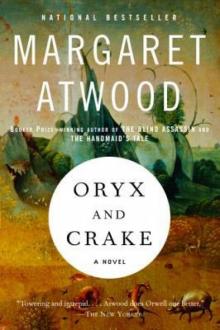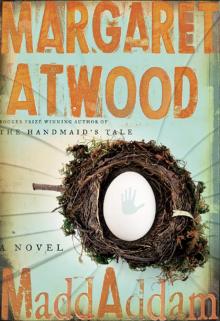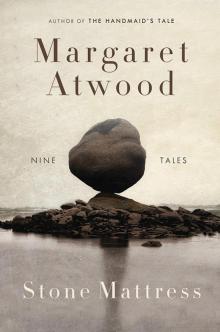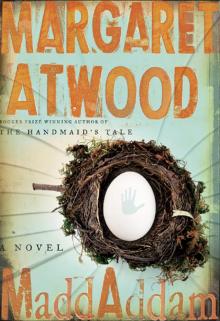- Home
- Margaret Atwood
The Penelopiad Page 5
The Penelopiad Read online
Page 5
xii
Waiting
What can I tell you about the next ten years? Odysseus sailed away to Troy. I stayed in Ithaca. The sun rose, travelled across the sky, set. Only sometimes did I think of it as the flaming chariot of Helios. The moon did the same, changing from phase to phase. Only sometimes did I think of it as the silver boat of Artemis. Spring, summer, fall, and winter followed one another in their appointed rounds. Quite often the wind blew. Telemachus grew from year to year, eating a lot of meat, indulged by all.
We had news of how the war with Troy was going: sometimes well, sometimes badly. Minstrels sang songs about the notable heroes - Achilles, Ajax, Agamemnon, Menelaus, Hector, Aeneas, and the rest. I didn't care about them: I waited only for news of Odysseus. When would he come back and relieve my boredom? He too appeared in the songs, and I relished those moments. There he was making an inspiring speech, there he was uniting the quarrelling factions, there he was inventing an astonishing falsehood, there he was delivering sage advice, there he was disguising himself as a runaway slave and sneaking into Troy and speaking with Helen herself, who - the song proclaimed - had bathed him and anointed him with her very own hands.
I wasn't so fond of that part.
Finally, there he was, concocting the stratagem of the wooden horse filled with soldiers. And then - the news flashed from beacon to beacon - Troy had fallen. There were reports of a great slaughtering and looting in the city. The streets ran red with blood, the sky above the palace turned to fire; innocent boy children were thrown off a cliff, and the Trojan women were parcelled out as plunder, King Priam's daughters among them. And then, finally, the hoped-for news arrived: the Greek ships had set sail for home.
And then, nothing.
*
Day after day I would climb up to the top floor of the palace and look out over the harbour. Day after day there was no sign. Sometimes there were ships, but never the ship I longed to see.
Rumours came, carried by other ships. Odysseus and his men had got drunk at their first port of call and the men had mutinied, said some; no, said others, they'd eaten a magic plant that had caused them to lose their memories, and Odysseus had saved them by having them tied up and carried onto the ships. Odysseus had been in a fight with a giant one-eyed Cyclops, said some; no, it was only a one-eyed tavern keeper, said another, and the fight was over non-payment of the bill. Some of the men had been eaten by cannibals, said some; no, it was just a brawl of the usual kind, said others, with ear-bitings and nosebleeds and stabbings and eviscerations. Odysseus was the guest of a goddess on an enchanted isle, said some; she'd turned his men into pigs - not a hard job in my view - but had turned them back into men because she'd fallen in love with him and was feeding him unheard-of delicacies prepared by her own immortal hands, and the two of them made love deliriously every night; no, said others, it was just an expensive whorehouse, and he was sponging off the Madam.
Needless to say, the minstrels took up these themes and embroidered them considerably. They always sang the noblest versions in my presence - the ones in which Odysseus was clever, brave, and resourceful, and battling supernatural monsters, and beloved of goddesses. The only reason he hadn't come back home was that a god - the sea-god Poseidon, according to some - was against him, because a Cyclops crippled by Odysseus was his son. Or several gods were against him. Or the Fates. Or something. For surely - the minstrels implied, by way of praising me - only a strong divine power could keep my husband from rushing back as quickly as possible into my loving - and lovely - wifely arms.
The more thickly they laid it on, the more costly were the gifts they expected from me. I always complied. Even an obvious fabrication is some comfort when you have few others.
My mother-in-law died, wrinkled up like drying mud and sickened by an excess of waiting, convinced that Odysseus would never return. In her mind this was my fault, not Helen's: if only I hadn't carried the baby to the ploughing ground! Old Eurycleia got even older. So did my father-in-law, Laertes. He lost interest in palace life, and went off to the countryside to rummage around on one of his farms, where he could be spotted shambling here and there in grubby clothing and muttering about pear trees. I suspected he was going soft in the head.
Now I was running the vast estates of Odysseus all by myself. In no way had I been prepared for such a task, during my early life at Sparta. I was a princess, after all, and work was what other people did. My mother, although she'd been a queen, had not set a good example. She didn't care for the kinds of meals favoured in the grand palace, since big chunks of meat were the main feature; she preferred - at the very most - a small fish or two, with seaweed garnish. She had a manner of eating the fish raw, heads first, an activity I would watch with chilled fascination. Have I forgotten to tell you she had rather small pointed teeth?
She disliked ordering the slaves about and punishing them, though she might suddenly kill one who was annoying her - she failed to understand that they had value as property - and she had no use at all for weaving and spinning. 'Too many knots. A spider's work. Leave it to Arachne,' she'd say. As for the chore of supervising the food supplies and the wine cellar and what she called 'the mortal people's golden toys' that were kept in the vast storehouses of the palace, she merely laughed at the thought. 'Naiads can't count past three,' she would say. 'Fish come in shoals, not lists. One fish, two fish, three fish, another fish, another fish, another fish! That's how we count them!' She'd laugh her rippling laugh. 'We immortals aren't misers - we don't hoard! Such things are pointless.' Then she'd slip off to take a dip in the palace fountain, or she'd vanish for days to tell jokes with the dolphins and play tricks on clams.
So in the palace of Ithaca I had to learn from scratch. At first I was impeded in this by Eurycleia, who wanted to be in charge of everything, but finally she realised that there was too much to be done, even for a busybody like her. As the years passed I found myself making inventories - where there are slaves there's bound to be theft, if you don't keep a sharp eye out - and planning the palace menus and wardrobes. Though slave garments were coarse, they did fall apart after a while and had to be replaced, so I needed to tell the spinners and weavers what to make. The grinders of corn were on the low end of the slave hierarchy, and were kept locked in an outbuilding - usually they were put in there for bad behaviour, and sometimes there were fights among them, so I had to be aware of any animosities and vendettas.
The male slaves were not supposed to sleep with the female ones, not without permission. This could be a tricky issue. They sometimes fell in love and became jealous, just like their betters, which could cause a lot of trouble. If that sort of thing got out of hand I naturally had to sell them. But if a pretty child was born of these couplings, I would often keep it and rear it myself, teaching it to be a refined and pleasant servant. Perhaps I indulged some of these children too much. Eurycleia often said so.
Melantho of the Pretty Cheeks was one of these.
Through my steward I traded for supplies, and soon had a reputation as a smart bargainer. Through my foreman I oversaw the farms and the flocks, and made a point of learning about such things as lambing and calving, and how to keep a sow from eating her farrow. As I gained expertise, I came to enjoy the conversations about such uncouth and dirty matters. It was a source of pride to me when my swineherd would come to me for advice.
My policy was to build up the estates of Odysseus so he'd have even more wealth when he came back than when he'd left - more sheep, more cows, more pigs, more fields of grain, more slaves. I had such a clear picture in my mind - Odysseus returning, and me - with womanly modesty - revealing to him how well I had done at what was usually considered a man's business. On his behalf, of course. Always for him. How his face would shine with pleasure! How pleased he would be with me! 'You're worth a thousand Helens,' he would say. Wouldn't he? And then he'd clasp me tenderly in his arms.
Despite all this busyness and responsibility, I felt more alone than ever. What wise counsellors
did I have? Who could I depend on, really, except myself? Many nights I cried myself to sleep or prayed to the gods to bring me either my beloved husband or a speedy death. Eurycleia would draw me soothing baths and bring me comforting evening drinks, though these came with a price. She had the irksome habit of reciting folk sayings designed to stiffen my upper lip and encourage me in my dedication and hard work, such as:
She who weeps when sun's in sky
Will never pile the platter high.
or:
She who wastes her time in moan
Will ne'er eat cow when it is grown.
or:
Mistress lazy, slaves get bold,
Will not do what they are told,
Act the thief or whore or knave:
Spare the rod and spoil the slave!
and more of that ilk. If she'd been younger I would have slapped her.
But her exhortations must have had some effect, because during the daytimes I managed to keep up the appearance of cheerfulness and hope, if not for myself, at least for Telemachus. I'd tell him stories of Odysseus - what a fine warrior he was, how clever, how handsome, and how wonderful everything would be once he got home again.
There was an increasing amount of curiosity about me, as there was bound to be about the wife - or was it the widow? - of such a famous man; foreign ships came to call with more frequency, bringing new rumours. They brought, also, the occasional feeler: if Odysseus were proved to have died, the gods forfend, might I perhaps be open to other offers? Me and my treasures. I ignored these hints, since news of my husband - dubious news, but news - continued to arrive.
Odysseus had been to the Land of the Dead to consult the spirits, said some. No, he'd merely spent the night in a gloomy old cave full of bats, said others. He'd made his men put wax in their ears, said one, while sailing past the alluring Sirens - half-bird, half-woman - who enticed men to their island and then ate them, though he'd tied himself to the mast so he could listen to their irresistible singing without jumping overboard. No, said another, it was a high-class Sicilian knocking shop - the courtesans there were known for their musical talents and their fancy feathered outfits.
It was hard to know what to believe. Sometimes I thought people were making things up just to alarm me, and to watch my eyes fill with tears. There is a certain zest to be had in tormenting the vulnerable.
Any rumour was better than none, however, so I listened avidly to all. But after several more years the rumours stopped coming altogether: Odysseus seemed to have vanished from the face of the earth.
xiii
The Chorus Line: The Wily Sea Captain, A Sea Shanty
As Performed by the Twelve Maids, in Sailor Costumes
Oh wily Odysseus he set out from Troy,
With his boat full of loot and his heart full of joy, For he was Athene's own shiny-eyed boy,
With his lies and his tricks and his thieving!
His first port of call was the sweet Lotus shore Where we sailors did long to forget the foul war; But we soon were hauled off on the black ships once more, Although we were pining and grieving.
To the dread one-eyed Cyclops then next we did hie, He wanted to eat us so we put out his eye; Our lad said, 'I'm No One,' but then bragged, ''Twas I, Odysseus, the prince of deceiving!'
So there's a curse on his head from Poseidon his foe, That is dogging his heels as he sails to and fro, And a big bag of wind that will boisterously blow Odysseus, the saltiest seaman!
Here's a health to our Captain, so gallant and free, Whether stuck on a rock or asleep 'neath a tree, Or rolled in the arms of some nymph of the sea, Which is where we would all like to be, man!
The vile Laestrygonians then we did meet, Who dined on our men from their brains to their feet; He was sorry he'd asked them for something to eat, Odysseus, that epical he-man!
On the island of Circe we were turned into swine, Till Odysseus bedded the goddess so fine, Then he ate up her cakes and he drank up her wine, For a year he became her blithe lodger!
So a health to our Captain where'er he may roam, Tossed here and tossed there on the wide ocean's foam, And he's in no hurry to ever get home -
Odysseus, that crafty old codger!
To the Isle of the Dead then he next took his way, Filled a trench up with blood, held the spirits at bay, Till he learned what Teiresias, the seer, had to say, Odysseus, the artfullest dodger!
The Sirens' sweet singing then next he did brave, They attempted to lure him to a feathery grave, While tied to the mast he did rant and did rave, But Odysseus alone learned their riddle!
The whirlpool Charybdis did not our lad catch, Nor snake-headed Scylla, she could not him snatch, Then he ran the fell rocks that would grind you to scratch, For their clashing he gave not a piddle!
We men did a bad turn against his command, When we ate the Sun's cattle, they sure tasted grand, In a storm we all perished, but our Captain reached land, On the isle of the goddess Calypso.
After seven long years there of kissing and woo, He escaped on a raft that was drove to and fro, Till fair Nausicaa's maids that the laundry did do, Found him bare on the beach - he did drip so!
Then he told his adventures and laid to his store A hundred disasters and sufferings galore, For no one can tell what the Fates have in store, Not Odysseus, that master disguiser!
So a health to our Captain, where'er he may be, Whether walking the earth or adrift on the sea, For he's not down in Hades, unlike all of we -
And we leave you not any the wiser!
xiv
The Suitors Stuff Their Faces
I was wandering in the fields the other day, if it was a day, nibbling on some asphodel, when I ran into Antinous. He usually struts about in his finest cloak and his best robe, gold brooches and all, looking belligerent and haughty, and shouldering aside the other spirits; but as soon as he sees me he assumes the guise of his own corpse, with blood spurting all down his front and an arrow through his neck.
He was the first of the Suitors that Odysseus shot. This performance of his with the arrow is meant as a reproach, or so he intends it, but it doesn't cut any ice with me. The man was a pest when he was alive, and a pest he remains.
'Greetings, Antinous,' I said to him. 'I wish you'd take that arrow out of your neck.'
'It is the arrow of my love, Penelope of the divine form, fairest and most sagacious of all women,' he replied. 'Although it came from the renowned bow of Odysseus, in reality the cruel archer was Cupid himself. I wear it in remembrance of the great passion I bore for you, and carried to my grave.' He goes on in this spurious way quite a lot, having had a good deal of practice at it while he was alive.
'Come now, Antinous,' I said. 'We're dead now. You don't have to blather on in this fatuous manner down here - you have nothing to gain by it. There's no need for your trademark hypocrisy. So be a good fellow for once and eject the arrow. It does nothing to improve your appearance.'
He gazed at me lugubriously, with eyes like a whipped spaniel's. 'Merciless in life, merciless in death,' he sighed. But the arrow vanished and the blood disappeared, and his greenish-white complexion returned to normal.
'Thank you,' I said. 'That's better. Now we can be friends, and as a friend you can tell me - why did you Suitors risk your lives by acting in such an outrageous way towards me, and towards Odysseus, not once but for years and years? It's not that you weren't warned. Prophets foretold your doom, and Zeus himself sent bird portents and significant thunderings.'
Antinous sighed. 'The gods wanted to destroy us,' he said.
'That's everyone's excuse for behaving badly,' I said. 'Tell me the truth. It was hardly my divine beauty. I was thirty-five years old by the end of it, worn out with care and weeping, and as we both know I was getting quite fat around the middle. You Suitors weren't born when Odysseus set out for Troy, or else you were mere babies like my son, Telemachus, or you were children at the very most, so for all practical purposes I was old enough to be your mother. You babbled on abou
t how I made your knees melt and how you longed to have me share your bed and bear your children, yet you knew perfectly well that I was all but past child-bearing age.'
'You could probably have still squeezed out one or two little brats,' Antinous replied nastily. He could barely suppress a smirk.
'That's more like it,' I said. 'I prefer straightforward answers. So, what was your real motive?'
'We wanted the treasure trove, naturally,' he said. 'Not to mention the kingdom.' This time he had the impudence to laugh outright. 'What young man wouldn't want to marry a rich and famous widow? Widows are supposed to be consumed with lust, especially if their husbands have been missing or dead for such a long time, as yours was. You weren't exactly a Helen, but we could have dealt with that. The darkness conceals much! All the better that you were twenty years older than us - you'd die first, perhaps with a little help, and then, furnished with your wealth, we could have had our pick of any young and beautiful princess we wanted. You didn't really think we were maddened by love for you, did you? You may not have been much to look at, but you were always intelligent.'
I'd said I preferred straightforward answers, but of course nobody does, not when the answers are so unflattering. 'Thank you for your frankness,' I said coldly. 'It must be a relief to you to express your real feelings for once. You can put the arrow back now. To tell you the truth, I feel a surge of joy every time I see it sticking through your lying, gluttonous neck.'
The Suitors did not appear on the scene right away. For the first nine or ten years of Odysseus's absence we knew where he was - he was at Troy - and we knew he was still alive. No, they didn't start besieging the palace until hope had dwindled and was flickering out. First five came, then ten, then fifty - the more there were, the more were attracted, each fearing to miss out on the perpetual feasting and the marriage lottery. They were like vultures when they spot a dead cow: one drops, then another, until finally every vulture for miles around is tearing up the carcass.

 Surfacing
Surfacing Hag-Seed
Hag-Seed Oryx and Crake
Oryx and Crake The Heart Goes Last
The Heart Goes Last The Handmaid's Tale
The Handmaid's Tale Lady Oracle
Lady Oracle Good Bones and Simple Murders
Good Bones and Simple Murders The Robber Bride
The Robber Bride Life Before Man
Life Before Man Alias Grace
Alias Grace The Blind Assassin
The Blind Assassin Cat's Eye
Cat's Eye The Testaments
The Testaments The Penelopiad
The Penelopiad MaddAddam
MaddAddam Dancing Girls & Other Stories
Dancing Girls & Other Stories On Writers and Writing
On Writers and Writing Selected Poems II (1976-1986)
Selected Poems II (1976-1986) Wilderness Tips
Wilderness Tips Dearly
Dearly The Tent
The Tent Bluebeard's Egg
Bluebeard's Egg The Edible Woman
The Edible Woman The Penelopiad: The Myth of Penelope and Odysseus
The Penelopiad: The Myth of Penelope and Odysseus Good Bones
Good Bones I Dream of Zenia with the Bright Red Teeth
I Dream of Zenia with the Bright Red Teeth Circle Game
Circle Game Choke Collar: Positron, Episode Two
Choke Collar: Positron, Episode Two Stone Mattress: Nine Tales
Stone Mattress: Nine Tales The MaddAddam Trilogy
The MaddAddam Trilogy Stone Mattress
Stone Mattress Power Politics
Power Politics MaddAddam 03 - MaddAddam
MaddAddam 03 - MaddAddam I’m Starved for You (Kindle Single)
I’m Starved for You (Kindle Single) Murder in the Dark
Murder in the Dark In Other Worlds
In Other Worlds Dancing Girls
Dancing Girls Moral Disorder
Moral Disorder